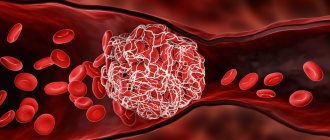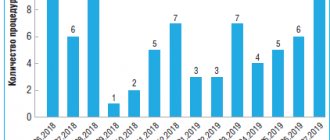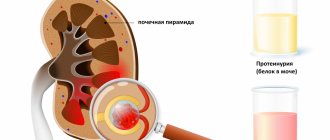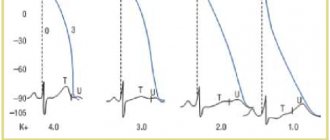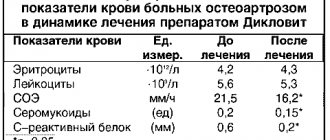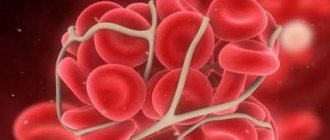Use of the drug Tenoten in clinical practice
In modern neurology and psychiatry, psychotropic drugs are actively used to suppress anxiety, fear, restlessness, emotional stress or reduce the severity of these symptoms. The article provides an overview of studies on the effectiveness and safety of the use of the drug Tenoten in the treatment of concomitant anxiety-depressive disorders, a new generation anxiolytic that has a wide spectrum of action (antidepressive, nootropic, neuroprotective, etc.) and does not cause side effects. Tenoten is actively used in neurological, psychiatric and somatic practice, in particular, for psychovegetative disorders, dyscirculatory encephalopathy of I–II degrees, cerebrovascular insufficiency in elderly patients, anxiety disorders, etc.
There is a relationship between the development of anxiety, depressive and other neurotic disorders and the brain-specific protein S100, which is expressed and secreted by microglial cells and astrocytes. The S100 protein plays an important role in the implementation of the basic functions of the neural systems of the brain, such as the generation and conduction of nerve impulses, regulation of synaptic and metabolic processes, proliferation and differentiation of neurons and glial cells. In this regard, a promising direction in the treatment of neurotic disorders is the use of drugs that regulate the activity of the S100 protein. The use of antibodies to the S100 protein appears to be a fundamentally new method of regulatory influence. The drug Tenoten contains ultra-low doses of affinity-purified antibodies to S100 [13]. Tenoten modifies the functional activity of the S100 protein, which ensures the neurotrophic effect of the drug, promotes the restoration of neuronal plasticity processes, and prevents the development of neurotic and neurosis-like conditions [13]. The neurotrophoprotective effect of Tenoten, especially pronounced in conditions of intoxication and hypoxia of the central nervous system, the absence of a sedative and muscle relaxant effect, and compatibility with other drugs make the drug promising for the relief of neurotic symptoms accompanying various somatic diseases. The pharmacological effects of Tenoten also include a stress-protective effect, regulation of the energy metabolism of neurons, and an effect on the proliferation and differentiation of brain cells. In addition, Tenoten has a wide spectrum of psychotropic, neurotropic, and vegetative modulating activity [13]. By interacting with the GABA-A-benzodiazepine receptor complex, Tenoten has a GABA-mimetic effect. The drug does not cause lethargy, daytime sleepiness, muscle relaxation, dependence and associated withdrawal syndrome even with long-term therapy, therefore it can be used in people leading an active lifestyle, drivers, etc. [13]. Indications for use of Tenoten are:
- neurotic and neurosis-like conditions, psychosomatic diseases;
- stress disorders with increased nervous tension, irritability, anxiety and autonomic reactions;
- moderately expressed organic lesions of the central nervous system, including those of traumatic and dyscirculatory origin, accompanied by instability of the emotional background, irritability, memory loss, and autonomic disorders.
It should be noted that for each of the areas of application of Tenoten, research is being conducted in several regions of Russia by independent research teams, which undoubtedly increases the reliability of the results obtained.
Use of the drug Tenoten in neurological practice
Tenoten in the treatment of psychovegetative disorders
About a third of patients with autonomic and anxiety disorders seek help from therapists. Diagnosis of such conditions does not cause difficulties, unlike the choice of rational treatment. The effectiveness of using the drug Tenoten in the treatment of psychopathological and vegetative symptoms was studied in Clinical Hospital No. 83 of the FMBA of Russia (Moscow). The study involved 2 groups of patients: patients in the main group, in addition to basic therapy, were prescribed Tenoten 2 tablets 3 times a day (duration 4 weeks), patients in the control group received only basic therapy. The main group included 40 patients aged 30–60 years with autonomic dysfunction syndrome (psychovegetative paroxysms, tension headaches (TTH), anxiety-depressive syndrome) and organic diseases of the central nervous system (dyscirculatory encephalopathy (DEP) stages I–II in combination with anxiety-depressive syndrome). The control group consisted of 20 patients aged 30–60 years with diagnoses of DEP and tension-type headache. To study the dynamics of the patients' condition at the beginning and after treatment, the level of anxiety and depression was assessed using neurological and psychological research methods, as well as an integral assessment of the current functional state of the body using the Telecard device, which records vegetative indicators using an ECG. Clinically, all patients complained of feelings of anxiety and decreased mood, sleep disturbance, pain of various localizations, increased fatigue, and high levels of reactive and personal anxiety. By the end of the 4th week of Tenoten therapy, these complaints regressed, and a significant decrease in the level of reactive and personal anxiety was noted in comparison with the control group. According to cardiointervalography data, before the start of treatment, the patients were found to have excessive autonomic activation in both the ergotropic and parasympathetic circuits, which indicated an unstable autonomic status and tension in the autonomic system. After 1 week of therapy, indicators of autonomic reactivity in the ergotropic circuit changed the most in patients taking Tenoten, in contrast to patients in the control group. The study showed that Tenoten in a dosage of 2 tablets 3 times a day already by the end of the 1st week has a vegetative-stabilizing effect, and by the end of the 4th week it has a pronounced anti-anxiety effect [15].
Tenoten in the complex therapy of transient cerebrovascular accidents
In patients who have suffered a transient cerebrovascular accident (TCI), the restoration of functional activity occurs 2 times slower if there are disturbances in the emotional sphere. An open comparative clinical and pharmacological study to assess the effectiveness and safety of Tenoten in the treatment of anxiety disorders in patients with PMN was conducted at the Central Clinical Hospital No. 1 of the Ural State Medical Academy (Ekaterinburg). 60 patients who underwent PNMC were examined; the average age was 42.1 ± 2.5 years. Patients were divided into 2 groups: patients in the main group (n = 31) took Tenoten, patients in the control group (n = 29) took Phenazepam.
Before and after treatment, the level of anxiety and depression was assessed using neurological and psychological research methods. The study recorded a significant decrease in the level of anxiety and depression. After stopping Tenoten, no patient clinically or subjectively experienced withdrawal syndrome in the form of increased anxiety and worsening mood, while withdrawal of Phenazepam may be accompanied by decreased mood, increased irritability, and sleep disturbances. The study showed that the anti-anxiety effect of Tenoten in patients with PNMC is comparable to the effect of the typical benzodiazepine drug Phenazepam. However, unlike the latter, Tenoten does not cause side effects and is better tolerated by patients. That is why Tenoten can be recommended for the treatment of patients with PNMC accompanied by anxiety and mild depressive disorders [1].
Tenoten in complex therapy of patients with DEP I–II degrees
One of the common reasons for a decrease in the quality of life of patients with chronic cerebrovascular pathology (CVP) is psychological distress, manifested by emotional disturbances in the form of anxiety and depression. The high percentage of disability, frequent complications, and low effectiveness of treatment for many CVP syndromes are largely explained not only by the progression of focal neurological symptoms, but also by emotional disorders. An assessment of the effectiveness of the use of Tenoten in the treatment of anxiety and depression in patients with chronic CVP was carried out on the basis of the neurological department of ICH No. 1 (Novosibirsk). Patients with grade I–II DEP were divided into 2 groups of 30 people. In the main group (average age 65 ± 9 years), in addition to basic therapy, Tenoten (2 tablets 3 times a day) was prescribed for 8 weeks. Patients in the control group (average age 60 ± 10 years) took drugs that improve cerebral circulation. To study the dynamics of the patients' condition at the beginning and after treatment, the level of anxiety and depression was assessed using clinical (changes in blood pressure (BP)) and psychological research methods. After 8 weeks of therapy with Tenoten, positive dynamics of blood pressure levels and general psychological well-being were observed, and a decrease in the severity of depressive episodes and anxiety disorders was noted. Thus, the data obtained allow us to recommend Tenoten in the treatment of anxiety and depressive conditions in patients with grade I–II DEP [3].
Tenoten in the complex treatment of anxiety in elderly patients with cerebrovascular insufficiency
Due to the fact that elderly patients are more sensitive to the side effects of psychotropic drugs, the Russian Gerontological Research and Clinical Center (Moscow) conducted a comparative study of the clinical effectiveness and tolerability of Tenoten and Cavinton in inpatient conditions in patients with organic pathology of the central nervous system. We examined 50 patients diagnosed with DEP due to cerebral atherosclerosis, consequences of acute cerebrovascular accidents and post-traumatic encephalopathy. The patients were divided into 2 groups: the main group (n = 30, average age 73.5 ± 2.1 years) received Tenoten 1 tablet 3 times a day against the background of basic therapy, the comparison group (n = 20, average age 75, 5 ± 1.8 years) – Cavinton 5 mg 3 times a day. The course of treatment is 28 days. The dynamics of subjective complaints, neurodynamic indicators, cognitive functions, and anxiety levels were assessed. The study noted positive dynamics in the subjective assessment of patients, an increase in the speed of movements in the hands, a decrease in the average time for performing a test for volume and switching of attention, memorizing 10 words and serial counting, and a significant decrease in the level of anxiety. A study of the clinical effectiveness of Tenoten showed that the drug can be recommended in gerontological practice in elderly patients with DEP as a means of improving cognitive function and having a pronounced anti-anxiety effect [11].
Use of the drug Tenoten in the treatment of somatic diseases
Patients with increased anxiety visit a cardiologist 6 times more often, a rheumatologist 2.5 times more often, a neurologist, urologist and ENT doctor 2 times more often, a gastroenterologist 1.5 times more often, and 1.5 times more often seek help from hospital In addition, their ability to work is reduced by 2–2.5 times. The prevalence of neurotic and somatoform disorders with anxiety symptoms in patients with arterial hypertension (AH) can reach 51.3%.
Tenoten in complex therapy of patients with diseases of the cardiovascular system
On the basis of the Medical and Sanitary Unit No. 25 of the Novosibirsk State Medical University, a study was conducted to assess the effectiveness and tolerability of combined treatment with antihypertensive drugs and the anti-anxiety drug Tenoten in patients with hypertension. The study involved 60 patients with hypertension (average age 61.41 ± 6.91 years), average disease duration – 10.61 ± 4.1 years. The patients were divided into two groups: the main group (n = 30) included patients with stage II–III hypertension who received Tenoten as part of basic therapy; The control group (n = 30) included patients with moderate hypertension who took antihypertensive drugs. Tenoten was prescribed for 1 month according to the following regimen: 6 tablets per day for the first 2 weeks, and then 1 tablet 3 times a day for another two weeks. The level of anxiety and blood pressure indicators were assessed before prescribing drugs, after 2 and 4 weeks of therapy. During Tenoten therapy, the level of anxiety decreased in the 2nd week, and blood pressure values significantly decreased by the end of the 4th week. Thus, we can conclude that the inclusion of Tenoten in the complex therapy of patients with hypertension increases the effectiveness of the treatment and promotes a more rapid onset of the hypotensive effect [7].
On the basis of the clinic of propaedeutics of internal diseases of the St. Petersburg State Medical University. acad. I.P. Pavlov conducted a comparative randomized study of the clinical effectiveness and safety of the drugs Tenoten and Grandaxin (tofisopam) in the treatment of anxiety disorders of a neurotic level in patients with diseases of the cardiovascular system. The patients were divided into 2 groups: the Tenoten group (n = 31) and the Grandaxin group (n = 20). Tenoten was prescribed 1 tablet 3 times a day, Grandaxin - 50 mg 2 times a day, the course of treatment was 4 weeks. All patients were therapeutically examined; at 1, 2, 4 weeks of treatment and 4 weeks after discontinuation of drugs, the level of anxiety and general clinical symptoms were assessed. During Tenoten therapy, a more pronounced reduction in anxiety and somatic symptoms (BP dynamics) was noted than in the Grandaxin group, and a positive assessment of the overall clinical impression was given. The spectrum of effects of Tenoten in comparison with Grandaxin on anxiety symptoms in patients with heart disease turned out to be more uniform, the stability of the clinical effect was more pronounced [2].
The effectiveness and tolerability of combination therapy with antiarrhythmic drugs and Tenoten in patients with coronary heart disease (CHD) with extrasystole and paroxysmal supraventricular tachyarrhythmias were assessed. On the basis of City Clinical Hospital No. 20 named after. I.S. Berzon (Krasnoyarsk) examined 60 patients with coronary artery disease, angina pectoris I–III functional class (FC), and cardiac arrhythmias aged from 42 to 79 years. The patients were divided into 2 groups: in the main group (n = 30, average age 64.4 ± 8.6 years), patients took Tenoten as part of basic therapy; in the control group (n = 30, average age 63.1 ± 8.5 years) – only antiarrhythmic therapy. Tenoten was prescribed at a dose of 2 tablets 3 times a day, after a week the dose of the drug was reduced to 3 tablets a day. The patients' condition was analyzed after 4 and 8 weeks using a physical examination method, blood pressure measurement, ECG, Holter monitoring and anxiety level assessment. According to the data obtained, in patients with coronary artery disease, angina pectoris class I–III and cardiac arrhythmias, Tenoten had a pronounced anti-anxiety effect. A positive antiarrhythmic effect (disappearance of paroxysmal atrial tachyarrhythmias and a decrease in the daily number of extrasystoles by at least 75%) was observed in 80% of patients in the main group and in 53.3% of the control group. Positive dynamics of the FC of angina pectoris were obtained, a decrease in the number and duration of episodes of myocardial ischemia (by at least 50% of the initial data) in the clinical picture of IHD was noted in 60% of cases in the main group and in 33.3% in the control group. Thus, the appointment of Tenoten in combination therapy for patients with diseases of the cardiovascular system not only has a pronounced anti-anxiety effect, but also improves the course of coronary artery disease, reducing the manifestations of angina pectoris, and also helps to normalize the heart rhythm [5].
Similar results were obtained in a comparative study of the effectiveness and tolerability of combination therapy with antihypertensive drugs and the drug Tenoten and therapy with antihypertensive drugs in combination with the benzodiazepine drug Clonazepam in patients with hypertension. The study included 60 patients from cardiology hospitals of the First Moscow State Medical University named after. THEM. Sechenov and the Institute of Clinical Cardiology named after. A.L. Myasnikov with various diseases of the cardiovascular system. The therapeutic diagnosis was determined taking into account the nature of heart rhythm disturbances:
- IHD, angina pectoris II–III FC, arterial hypertension II–III stage;
- postmyocardial cardiosclerosis;
- dyshormonal myocardial dystrophy;
- rheumatism, inactive phase, combined heart defects with various heart rhythm disturbances (sinus tachycardia, ventricular and supraventricular extrasystoles, paroxysmal atrial fibrillation, paroxysmal atrial fibrillation, paroxysmal atrial fibrillation, permanent atrial fibrillation).
All patients were diagnosed with anxiety spectrum disorders. Patients were divided into 3 groups:
- 30 people (average age 54.1 ± 5.2 years) received Tenoten 2 tablets 3 times a day;
- 20 people (mean age 59.2 ± 5.1 years) took Clonazepam (0.5–1 mg per day);
- 10 people (mean age 57.9 ± 4.8 years) received only somatotropic therapy.
The duration of treatment with Tenoten and Clonazepam was 28 days. The condition was assessed at the beginning, on the 14th and 28th days of therapy, taking into account the dynamics of the level of anxiety, depression and functional disabilities. After 4 weeks of therapy, the indicators changed significantly in the Tenoten and Clonazepam groups. When studying the somatic state of patients (in particular, the results of 24-hour Holter monitoring), all patients noted a subjective improvement in their well-being and a decrease in the intensity of hypochondriacal reactions. During the study, 5 patients taking Clonazepam at the beginning of treatment experienced a slight slowdown in mental and motor reactions, a feeling of fatigue, lethargy, and daytime drowsiness. In patients taking Tenoten, these undesirable side effects were not detected. After discontinuation of the drug at the end of the study for a week, not a single patient clinically or subjectively experienced withdrawal syndrome in the form of increased anxiety and deterioration of somatic condition. Thus, the appointment of Tenoten is possible in the treatment of anxiety neurotic disorders in patients with diseases of the cardiovascular system, in particular, with rhythm disturbances of various etiologies. It should be noted that the psychopharmacological value of Tenoten increases significantly due to the absence of side effects and the likelihood of developing dependence on the drug, which is extremely important for cardiac patients [8].
Tenoten in complex therapy of patients with gastrointestinal diseases
Currently, peptic ulcer disease is generally considered to be a multifactorial psychosomatic disease, in the pathogenesis of which emotional and psychosocial factors play a significant role. A study was conducted to assess the dynamics of the level of anxiety during Tenoten therapy in patients with Helicobacter pylori-associated duodenal ulcer. 102 patients of the gastroenterological department of the clinic of the State Research Institute of Medical Problems of the North of the Siberian Branch of the Russian Academy of Medical Sciences (Krasnoyarsk) were examined. Patients were divided into 2 groups: patients in the main group (n = 49, age 42.3 ± 2.81 years) took Tenoten 2 tablets 3 times a day for 3 weeks, in the control group (n = 53, age 41, 8 ± 2.36 years) patients received basic therapy. The dynamics of the condition were assessed based on the results of a study of the level of anxiety, determination of the size of the ulcerative defect during esophagogastroduodenoscopy, and a decrease in the incidence of pain in the epigastric region on the 10th and 20th day from the start of therapy. During therapy with Tenoten, a direct correlation was revealed between a decrease in the level of anxiety and the frequency of pain in the epigastric region. In the group of patients taking Tenoten, already on the 10th day from the start of therapy, more pronounced changes in indicators were noted, which significantly differed by the 20th day. Thus, the prescription of Tenoten as a complex therapy drug in patients with duodenal ulcer promotes positive clinical dynamics in the healing of ulcerative defects [14].
The effectiveness of Tenoten as a means of secondary prevention of relapses of duodenal ulcer (DU) was studied at the Department of Faculty Therapy of Surgut State University. The study involved 25 patients with chronic gastroduodenitis (CGD) and DU in the stage of unstable remission with annual seasonal exacerbations aged 20–59 years, the average duration of the disease was 11.3 ± 8.5 years, the average duration of residence in the North was 24. 1 ± 11.1 years. Tenoten was prescribed 1 tablet 2 times a day for a month (July – August) for the purpose of secondary prevention of autumn relapses. The effectiveness of Tenoten therapy was assessed based on the dynamics of the level of anxiety; the state of autonomic regulation was assessed using analysis of heart rate variability according to cardiointervalogram data. Analysis of the dynamics of clinical symptoms showed that as a result of the course of treatment, the frequency of complaints of intestinal dyspepsia, heartburn, pain and discomfort in the epigastric region significantly decreased. During therapy with Tenoten, a significant decrease in the severity of anxiety and a significant increase in the proportion of low-frequency heart rate waves, reflecting an increase in sympathetic activity, were noted. Spectral analysis of the active orthostatic test in the group of treated patients showed an adequate increase in sympathetic tone by 1.06 times and a decrease in parasympathetic influence by 1.76 times. As a result of the course of treatment with Tenoten, the studied parameters stabilized. Annual prophylactic use of the drug Tenoten as an additional anti-relapse agent helps to increase the duration and quality of remission of chronic gastroduodenitis and duodenal ulcer. Dispensary observation of patients with DU and CGD during the first year after preventive treatment with Tenoten showed that the number of clinical exacerbations (relapses) among patients in this group decreased by 2.4 times, and hospitalizations by 5 times. The appointment of Tenoten in the complex therapy of CGD and PUD helps to reduce the level of anxiety, stabilize autonomic homeostasis, reduce the severity of clinical symptoms and consolidate remission [4].
A clinical study was conducted on the effect of the drug Tenoten on the reduction of anxiety symptoms in patients with hypomotor biliary dyskinesias. At the Department of Therapy and Clinical Pharmacology of the St. Petersburg Medical Academy of Postgraduate Education, 41 patients were examined. Two groups were compared: patients in the main group (n = 21, average age 41 years) took Tenoten, patients in the control group (n = 20, average age 35 years) received basic therapy. Tenoten was prescribed 2 tablets 3 times a day, duration of administration was 1 month.
In order to study the dynamics of the patients' condition at the beginning of therapy and after 1 month of taking Tenoten, the level of anxiety and asthenia was assessed, as well as a subjective assessment of the effectiveness of therapy using a visual analogue scale. In addition to a significant reduction in the level of anxiety and depression, Tenoten’s effect on motor skills was noted, which was reflected in a decrease in dyskinetic phenomena while simultaneously increasing the contractility of the gallbladder and reducing the severity of pain, which makes it possible to recommend it for functional motor disorders of the cholangiopancreaticoduodenal zone [12].
Similar data assessing the effectiveness of Tenoten in the treatment of asthenodepressive disorders in 85 patients with cholelithiasis and irritable bowel syndrome were obtained during a study at the gastroenterology department of Kazan State Medical University. The authors came to the conclusion that the inclusion of Tenoten in complex therapy for diseases of the digestive tract will make it possible to carry out treatment much more effectively, restore ability to work in a shorter time and improve the quality of life of patients [6].
Use of the drug Tenoten in the treatment of neurotic disorders
At the Research Institute of Mental Health of the Siberian Branch of the Russian Academy of Medical Sciences (Tomsk), a study was conducted on the clinical effectiveness of Tenoten in outpatient settings in patients with neurotic disorders and people with pre-neurotic conditions. 47 patients were examined, of which the main group consisted of 22 patients (average age 42.7 ± 3.7 years) with neurotic disorders undergoing treatment at the Interdepartmental Center of the Scientific Research Institute of Mental Health of the Siberian Branch of the Russian Academy of Medical Sciences, the other group - 25 patients (average age 40.1 ± 5.2 years) with preneurotic conditions. In the group with neurotic disorders, Tenoten was prescribed 1 tablet 3 times a day, in the group with pre-neurotic conditions - 1 tablet 1-2 times a day, treatment duration - 2 weeks. A classification of premorbid disorders and a technique for early detection of premorbid mental health disorders using a screening questionnaire were used. Changes in anxiety levels and quality of life were assessed. All patients complained of a feeling of anxiety and restlessness of a transient nature, a feeling of tension, the inability to relax and determine the importance of work, decreased ability to work, attention, and mood; somatic and vegetative manifestations aggravated the condition and disrupted the usual rhythm of activity. By the end of the first week, during therapy with Tenoten, positive dynamics of the condition were noted: a decrease in anxiety and asthenic manifestations, a decrease in mnestic difficulties, and an increase in the speed of switching attention. During the second week, vegetative manifestations stabilized, general well-being improved, interpersonal relationships were restored, productivity and mood increased, a desire for active activity appeared, an increase in the level of quality of life was noted, and a continued decrease in the level of anxiety. Thus, we can say that the drug Tenoten, which has thymoleptic and psychostimulating properties, is highly effective in the treatment of anxiety and asthenia in patients with neurotic disorders and preneurotic conditions [9].
Conclusion
Studies have shown the high effectiveness of the drug Tenoten (2 tablets 3 times a day, course 4 weeks) in the treatment of anxiety-depressive disorders and asthenic manifestations. By the end of the 1st week, a vegetative stabilizing effect of the drug was noted, after 2 weeks - an initial decrease in the level of anxiety, which reaches its maximum manifestation by the end of the 4th week from the date of Tenoten's prescription. In some cases (for example, stage I-II DEP), the course of treatment with Tenoten (2 tablets 3 times a day) can be extended to 8 weeks. If the drug is prescribed to elderly patients, the dose of Tenoten is reduced to 1 tablet 3 times a day, the duration of administration is 4 weeks. Thus, based on the analysis of studies on the effectiveness of the drug Tenoten, conducted in clinics of various profiles, final conclusions can be drawn.
- In neurological patients (with functional and organic diseases of the central nervous system) with psychovegetative and dyscirculatory disorders, Tenoten has a vegetative stabilizing, pronounced anti-anxiety (comparable to the benzodiazepine anxiolytic - Phenazepam) and nootropic (improving cognitive functions) effect.
- In complex therapy of patients with diseases of the cardiovascular system, Tenoten has a pronounced anti-anxiety effect (not inferior to benzodiazepine anxiolytics - Grandaxin and Clonazepam) and increases the effectiveness of treatment, promoting a more rapid decrease in blood pressure, normalization of heart rate and a decrease in the frequency of angina attacks.
- In the complex therapy of diseases of the digestive tract, Tenoten, in addition to a significant reduction in anxiety and depressive symptoms, helps to stabilize autonomic homeostasis, which leads to a decrease in the severity of clinical symptoms (reduction of dyskinetic phenomena, pain intensity, healing of ulcerative defects, etc.) and consolidation of remission. Overall, this significantly increases the effectiveness of treatment, reduces the time required for recovery and improves the quality of life of patients.
- The pharmacotherapeutic value of Tenoten increases significantly due to the absence of side effects and the likelihood of developing dependence on the drug, which is extremely important for patients with both neurological and somatic profiles.
- In the treatment of pre-neurotic and neurotic disorders, Tenoten simultaneously has an anti-anxiety and asthenic effect, helps stabilize vegetative manifestations, reduce mnestic difficulties (increases the speed of attention switching), which generally improves overall well-being and improves the quality of life of patients.
The role of anxiety disorders in hypertension and the possibility of their correction
In recent years, more and more evidence has accumulated that anxiety and some other psychopathological conditions are independent risk factors for the development of arterial hypertension (AH) and should be considered in conjunction with recognized risk factors [7]. These pathologies increase the morbidity and mortality from hypertension and coronary heart disease (CHD) [2]. Anxiety disorder should be promptly identified and treated, as it worsens the prognosis of somatic pathology [1]. The importance of anxiety disorder in cardiology is confirmed by the results of a prospective 32-year study conducted in the United States by the Centers for Disease Control and Prevention [7], which showed that with increased anxiety, the likelihood of fatal myocardial infarction increases by 1.9 times, sudden death by 4 times. ,5 times. At the same time, social epidemiological studies using objective methods conducted at the State Scientific Research Center for Preventive Medicine showed that the population experienced an increase in the level of psychological stress. It was found that about 70% of the country's population lives in conditions of chronic psychosocial stress of high and moderate levels [3].
In this regard, special attention is paid to studying the role of anxiety in the development of hypertension - one of the main risk factors for coronary artery disease. It is known that hypertension is one of the most common cardiovascular diseases, which affects, in particular, 25–35% of the Russian population. Assumptions that affective disorders, most often anxiety and depression, occupy an important place in the development and course of hypertension were expressed at the beginning of the last century. Currently, work to study the relationship between hypertension and affective disorders is carried out in two directions.
On the one hand, the results of large studies have been published demonstrating the relationship between symptoms of anxiety or depression and the development of hypertension; on the other hand, hypertension is considered as a psychosomatic disease, in the treatment of which psychotropic drugs play a very important role [4].
According to the literature, the prevalence of neurotic and somatoform disorders with anxiety symptoms in patients with hypertension can reach 51.3% [2, 5]. However, the number of studies is limited and clear recommendations for the management of such patients do not exist. It is known that comorbid anxiety-depressive disorders, like hypertension, themselves lead to a significant decrease in working capacity, while they aggravate the course of somatic illness and contribute to the formation of a hypochondriacal type of internal illness [7]. In this regard, it seems very interesting and important to determine the possibility of the influence of complex therapy with antihypertensive drugs and a “daytime” anxiolytic on the course of hypertension in patients with anxiety.
Anxiolytic therapy significantly improves the quality of life of patients with cardiovascular diseases, promotes their better compensation in the process of somatotropic therapy, and subsequently adaptation to the disease. Tranquilizers are the most adequate, effective and safe drugs for the relief of adaptation disorders in cardiac patients [2, 3]. However, patients often avoid taking benzodiazepines for fear of developing symptoms of addiction, unpleasant side effects such as lethargy, muscle weakness, and impaired attention. Elderly patients are often afraid of developing coordination problems due to the fear of falling and the appearance of instability.
Taking into account the noted problems, in recent years there has been an increasing need for drugs with a tranquilizing effect of the non-benzodiazepine series. These drugs include Tenoten.
The drug Tenoten is an ultra-low dose (USD) to the brain-specific protein S100. The mechanisms of action of anti-S100 SMD in anxiety conditions are probably associated with modification of the functional activity of the endogenous S100 protein and its ligands. As a result, its GABA-mimetic effect is realized and GABAergic neurotransmission is restored. The clinical effect is manifested by facilitating falling asleep, reducing behavioral manifestations of anxiety, improving memory, and reducing asthenia.
The purpose of the study was to evaluate the effectiveness and tolerability of combined treatment with antihypertensive drugs and the anti-anxiety drug Tenoten in patients with hypertension. The duration of the study is 4 weeks.
The study involved 60 patients with hypertension aged 61.41 ± 6.91 years (from 38 to 77 years). The patients were randomly divided into two groups (main and control) of 30 people each. There were 18 men and 12 women in the main group, and 19 men and 11 women in the comparison group.
In the main group, hypertension with a moderate course (grade II) was observed in 60% of patients, with a severe course (grade III) - in 40%; in the comparison group, there were 66.6% of patients with a moderate course, and 33.4% with a severe course. The average duration of hypertension disease was 10.61 ± 4.1 years (from 3 to 20 years).
Family history, lifestyle, risk factors and concomitant pathologies are of great importance in the course of hypertension.
Persons with symptomatic hypertension and complicated forms of hypertension were excluded from the study.
In the comparison group, patients received only antihypertensive therapy - ACE inhibitors, β-blockers, diuretics (Enap, Hypothiazide, Acridilol, Arifon). Patients of the main group received combination treatment with antihypertensive drugs in combination with Tenoten, which was prescribed according to the scheme: 6 tablets per day for the first 2 weeks, and then 1 tablet 3 times a day.
Treatment was prescribed for a month. Dynamic monitoring was carried out at the beginning of the study, after 2 and 4 weeks of therapy.
To assess mental status, we used the Personal Anxiety Scale (J. Teylor), which is designed to measure the level of anxiety (adapted by T. A. Nemchininov).
The questionnaire consists of 50 statements. The results of the study are assessed by counting the number of responses from the subject indicating anxiety; the total score is:
40–50 points is an indicator of a very high level of anxiety;
20–40 points – high level of anxiety;
15–20 points – average level of anxiety with a tendency to high;
5–15 points - average level of anxiety with a tendency to low;
0–5 points—low level of anxiety.
A study of the mental status of patients in both groups revealed anxiety symptoms of varying severity in a significant proportion of patients. The number of patients with an initial high level of anxiety was 40% in the main group and 43% in the comparison group. The number of patients with an initial average level of anxiety with a tendency to high was 60% in the main group and 56.6% in the comparison group.
Research results
By the end of the study, the high level of anxiety decreased in the main group by 39.39% and reached an average level of anxiety with a tendency to low, while in the comparison group the level of anxiety decreased by only 3.6%.
In patients of the main group who took Tenoten, a clear decrease in the level of anxiety was noted after 2 weeks and by the end of the month reached significance in comparison with the group of patients who received standard antihypertensive therapy. Relief of affective disorders was accompanied by a decrease in complaints of anxiety, feelings of helplessness, self-doubt, a sense of impending danger, and poor sleep (Table 1).
The demonstrated differences in the dynamics of anxiety indicators in the studied groups of patients confirmed the possibility of effective correction of these disorders in patients with hypertension with the drug Tenoten. However, it was extremely interesting to assess whether this therapy and the severity of concomitant anxiety disorders influence the effectiveness of antihypertensive therapy in general.
A decrease in the values of maximum systolic and diastolic pressure occurred in both study groups. By the end of the month of treatment, the decrease in blood pressure (BP) reached statistically significant significance. In the main group of patients who additionally took Tenoten, systolic blood pressure (BP) decreased by 24.28% - almost to the age norm; in the comparison group there was a decrease of 16.48%, i.e. a slight excess of normal values was noted. The decrease in diastolic pressure by the end of the 4th week in the main group (by 17.7%) and in the comparison group (by 5.9%) was also significant (Table 2).
The addition of Tenoten to complex therapy in patients with high and moderate levels of anxiety allowed us to achieve a significantly more pronounced improvement in blood pressure. During Tenoten therapy, a more rapid effect of antihypertensive drugs is observed - after 2 weeks of combined use of the drug in patients of the main group, blood pressure decreased to the target level, in contrast to the comparison group, where it remained above the target.
Conclusion
The results of our study show that all patients with hypertension exhibit anxiety symptoms of varying severity, which aggravate the course of the disease, contributing to higher increases in the level of both systolic and diastolic blood pressure. The inclusion of the modern “daytime” anxiolytic Tenoten in the complex therapy of patients with hypertension increases the effectiveness of the treatment, reduces the level of anxiety, which contributes to a more rapid onset of the hypotensive effect. Tenoten is well tolerated by patients and does not cause orthostatic hypotension or any other undesirable side effects.
Literature
- Avedisova A. S. Anxiety disorders // Yu. A. Aleksandrovsky. Mental disorders in general medical practice and their treatment. M.: GEOTAR-MED, 2004. pp. 66–73.
- Kopina O. S., Suslova S. F., Zaikin E. R. Population studies of psychosocial stress as a risk factor for cardiovascular diseases // Cardiology. 1996. No. 36 (3). pp. 53–56.
- Sudakov K.V. Emotional stress and arterial hypertension. M.: VNIIMI, 1976.
- Chazov E.I. Coronary heart disease and the possibility of increasing the effectiveness of its treatment // Clinical trials of drugs in Russia. 2001. No. 1. P. 2–4.
- Kawachi I., Sparrow D., Vokonas PS, Wess ST Symptoms of anxiety and risk of coronary heart disease. The Normative Aging Study. Circulation. 1994; 90, 5: 2225–2229.
- Lavie C., Milani R. Prevalence of anxiety in coronary patients with improvement following cardiac rehabilitation and exercise training. Am J Cardiol. 2004; 93:336–339.
- Sonas BS, Franks P., Ingram DD Are symptoms of anxiety and depression risk factor for hyprtension? Longitudinal evidence from the National Health and Nutrition Examination Survey I Epidemiologic Follow-up Study. Arch. Fam. Vtd. 1997; 6:43–9.
I. N. Nikolskaya , Doctor of Medical Sciences, Professor I. A. Guseva , Candidate of Medical Sciences, Associate Professor E. V. Bliznevskaya , Candidate of Medical Sciences, Associate Professor T. V. Tretyakova , Candidate of Medical Sciences NSMU, Medical Unit No. 25, g Novosibirsk
